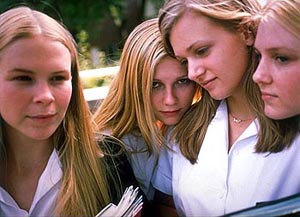|
|
Are You With Us?: The Virgin SuicidesBy Ryan MazieAugust 12, 2010
Where Coppola does succeed is at intimate moments with scenes involving just a few characters and dialogue, able to include the viewer as a member of the conversation, instead of an observer watching. I appreciated the intimacy given the literally dire thematic material involved. In a country where over 60% of teens seriously contemplate suicide, 9% have attempted it at least once and it is the 11th leading cause of death for all Americans (according to the Centers for Disease Control), The Virgin Suicides grim tale is definitely with us now more than ever for its thoughtful yet emotionally lacking look into the subject that both sexes can appreciate, thanks to the gender-perspective narrating. Virgin has seemingly slipped through the cracks, after the much better teen-suicide, based-on-a-book, dark-humored drama of 1999, Girl, Interrupted, won over audiences and accolades. However, what keeps this film out of the retail store dollar bin is the great performances Coppola wrings from her lead actors. Dunst, an actress who always brings a little something extra to a role, holds the screen against her five other sisters, being vulnerable on the inside while a “stone fox” on the outside. The film also introduced early-2000s it-boy Josh Hartnett, who isn’t given much to do but flirt, yet he gives some of the films funniest moments, like when asking his gay father's advice on picking up a girl – a needless scene but one that breaks up the tension. Kathleen Turner (in one of her last roles on the big screen before fully focusing on stage work) and James Woods steal scenes as the girls buttoned-up overly bearing Christian parents who confine the girls. Where Coppola fails in the screenplay is giving her characters depth, something that if done could have easily given Turner and Woods chances at an Oscar, an award that has eluded both of them in their lengthy careers. Coppola has made a lengthy career path for herself, receiving box office and critical success with the first installment of Bill Murray’s “manopause” period of films, Lost In Translation, winning her an Oscar for best writing. In 2006 she re-teamed with Dunst, having her play the titular role in Marie Antoinette, in the overly artistic and indulgent, somewhat fictional account of the well-known historical figure.
|

|
|
|

|
Saturday, May 4, 2024
© 2024 Box Office Prophets, a division of One Of Us, Inc.


